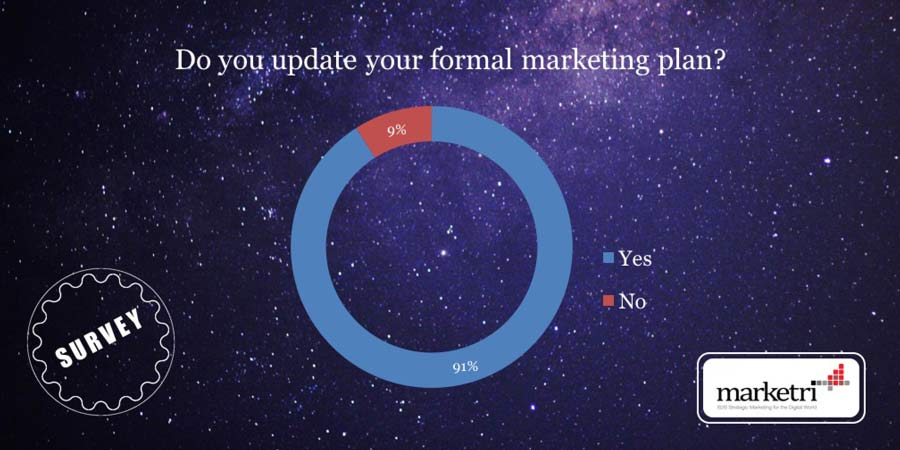What 68% of Companies Do With a Formal Marketing Plan (Part 2)
In Part One, we looked at why 32% of companies have no formal marketing plan. In Part Two, we’re returning to our survey results to explore the 68% of companies that DO have a marketing plan.
We asked these respondents questions about how often the plan gets updated and how effective the plan is for their company. Let’s dive into their answers.
1) A good start to a formal marketing plan is important.
To get a gauge on how often companies update their marketing plans, we asked two questions:
- Does your company update the plan annually to align with strategic goals?
- Is the plan a living document that gets reviewed and updated throughout the year?
Our goal was to separate the companies that set and forget their plans at the start of the year from the companies who actively refine their plans. However, respondents answered each question the same way:
- 91% said “Yes,” and
- 9% said “No.”
This is a promising sign, and it reiterates exactly what we say to clients. If you are going to create a strategic marketing plan it needs to be looked at frequently. Annual updates are great for bigger strategic changes or to accommodate refined company goals, and more frequent adjustments and reviews can ensure traction. By revisiting and refining it, you can make sure you don’t waste your marketing plan.

Based on years of working with and consulting clients on the need for a strategic, formal marketing plan, we can assume that the folks in these companies sat down prior to a new year starting and asked questions like:
- What are the company’s strategic goals?
- How should the marketing plan align to those goals?
- What specific tactics will be included in that marketing plan to achieve the overall objectives?
- When should this plan be rolled out so that everyone on the team (and perhaps the company) knows the plan?
- Where will we store this plan?
- How often will we review this plan?
- What constitutes a good reason(s) to change this plan?
All these initial upfront questions and planning will ensure that a company is wisely investing their time and efforts and will also ensure they are set up for success as they leverage their resources and promote their products and services to their target audiences.
But when the rubber meets the road, and all the planning is done and implementation has begun, an even more important question to ask is: How Effective Was Your Plan?
2) But it’s not how you start a formal marketing plan, it’s how you finish it.
81% of respondents said their marketing plans were effective in driving desired results. When we asked them how they knew, we received responses that fit into two buckets:
Tracking Metrics & Data
It appears these respondents have set up KPIs and then measure their progress. This was conveyed in responses like:
- “The marketing plan includes metrics that have to be hit”
- “We use HubSpot and Salesforce to track results. We also review quarterly to make sure key initiatives are progressing and course correct when projects are at risk.”
- “Our website traffic and social traffic is continuously on the incline”
- “Drives lead generation that drives sales”
- “Our marketing goals change from year to year, from bringing in additional customers to increasing repeat business, but all of the marketing goals are numbers-based and therefore very easy to measure and track”
Setting metrics and tracking progress contributes to effectiveness. It ensures that everyone knows the results they’re trying to drive with their actions.

Collaboration
These respondents also appear to be focused on effective cross-team collaboration, based on responses like:
- “Work closely with the Marketing Department as it relates to technology”
- “I review the plan every three months with executive teams”
- “Our marketing plan supports those yearly sales and brand awareness goals”
Collaboration and cultural alignment toward strategic goals can make the difference between stagnancy and real revenue growth.
Reasons for Ineffectiveness
The 19% of folks who reported their plans were not effective included reasons like:
- “We are not meeting our sales plan for the marketed products”
- “Halfway through the year situations change and marketing is unable to adapt/make changes”
- “It doesn’t drive the goals because the goals keep changing”
Unsurprisingly, ineffective plans occur in companies on the opposite end of the tracking-and-collaboration spectrum. Without strategic commitment and focus on driving specific numbers, it is difficult to make real progress. (Going further, the 10% gap between those that report effectiveness (81%) and those that report ongoing updates of their plans (91%), may be struggling in similar ways.)
Once again, these answers point to leadership and culture issues. Without leadership commitment and a cultural focus on growth, there’s little context for marketing actions and cross-team collaboration. Alignment is critical to marketing effectiveness.
Thanks for Reading!
We are grateful to those who took the time to complete our survey and for all the insights that they shared. We are also thankful (and not surprised) for the overwhelming majority who reiterated our belief in the importance of a formal, marketing plan that is reviewed frequently and adjusted appropriately.
If you’re interested in more marketing insights, be sure to subscribe to our marketing strategy blog to receive updates whenever we publish a post. You can also learn more about the benefits of strategic marketing plans by downloading our resource below.

Check out these recent insights from our subject matter experts.





